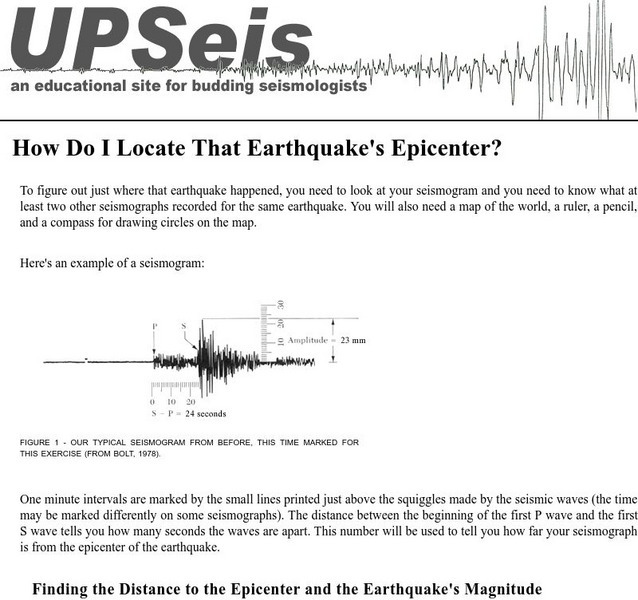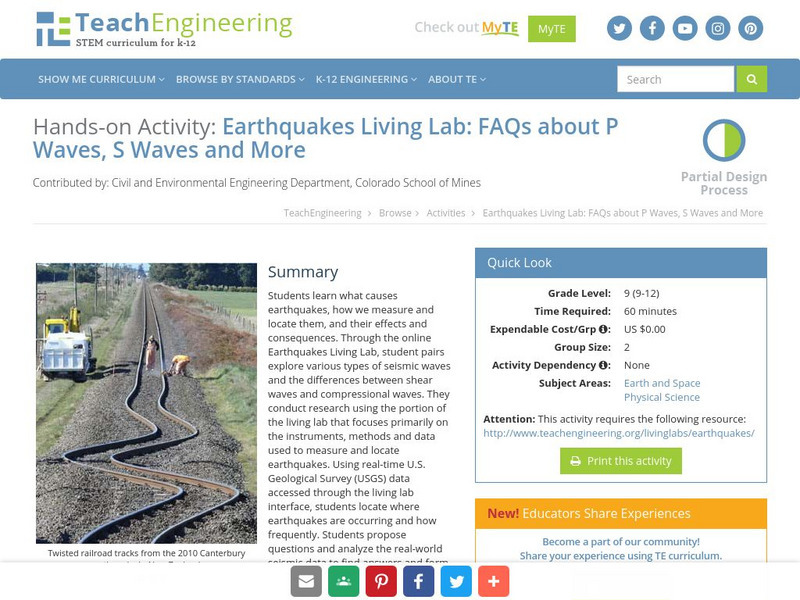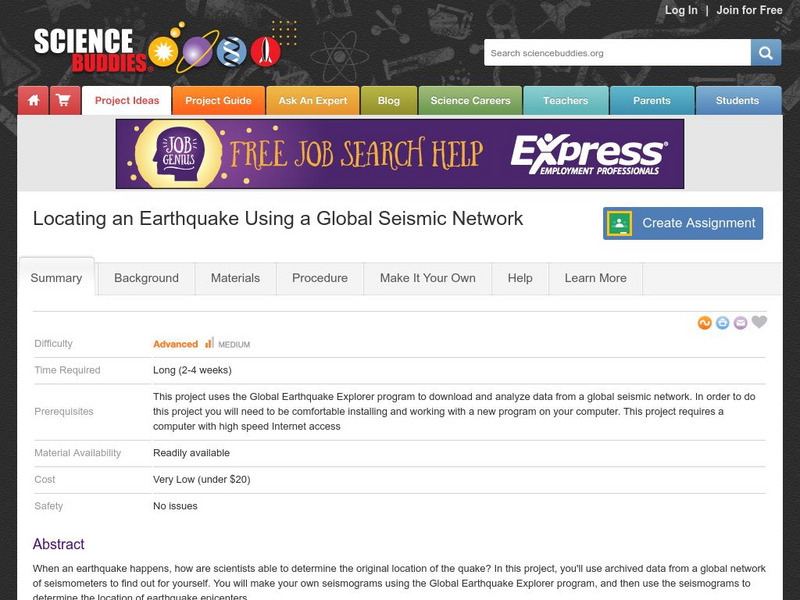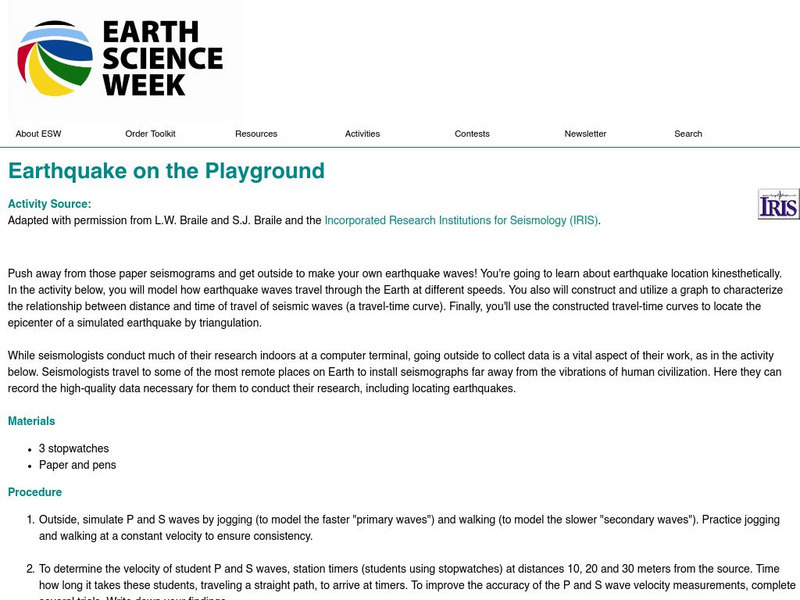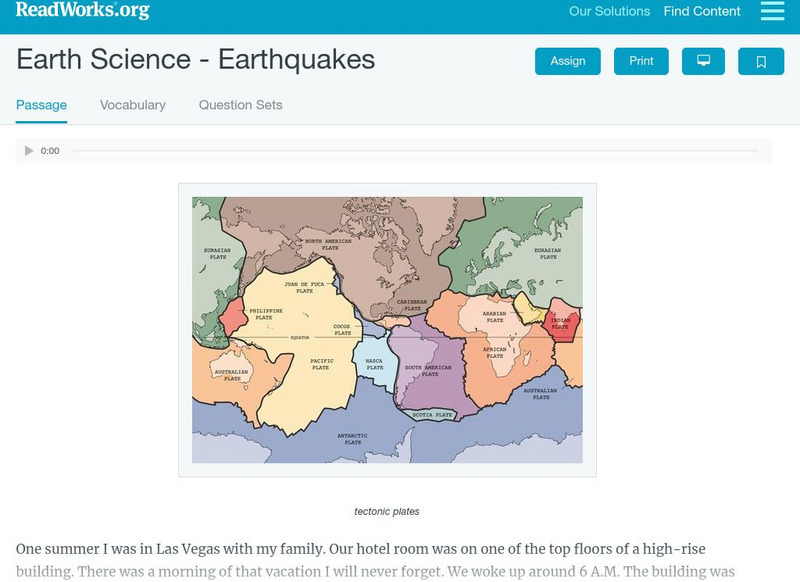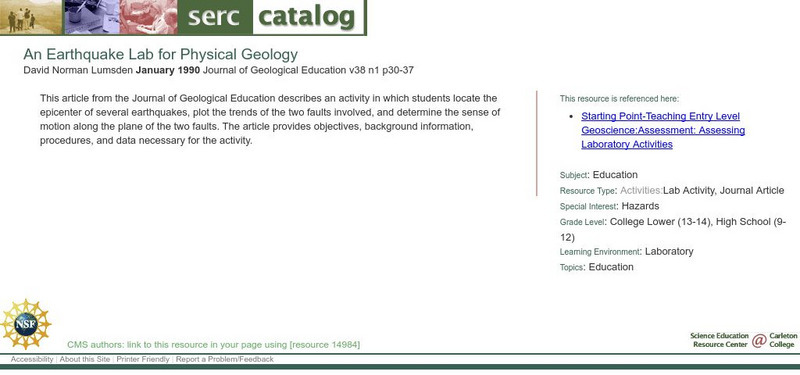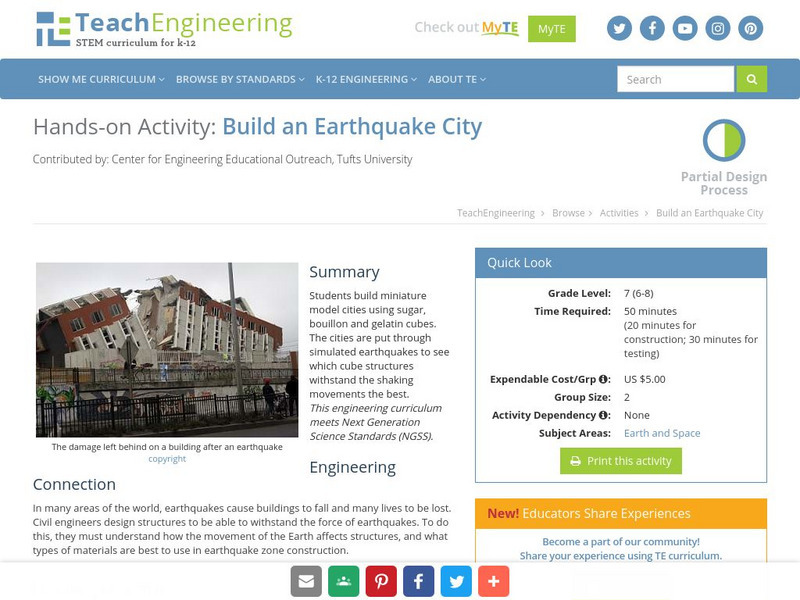CK-12 Foundation
Ck 12: Earth Science: Earthquake Characteristics Study Guide
This comprehensive study guide covers the main terms and concepts needed for an earth science unit on the characteristics of earthquakes. Review questions are included at the bottom of the study guide.
Scholastic
Scholastic: Study Jams! Science: Landforms, Rocks & Minerals: Earthquakes
A video and a short multiple-choice quiz on earthquakes, how they form, how they are measured, and the ways they can change the surface of the Earth.
Michigan Technological University
Michigan Tech: Locating an Earthquake's Epicenter
Gives directions on how to find the epicenter of an earthquake, the distance to the epicenter and the magnitude of the earthquake.
Science Education Resource Center at Carleton College
Serc: Subduction Zone Earthquakes
For this lesson, young scholars manipulate a model, consisting of templates on a piece of paper and an overlaying transparency, in order to explore the characteristics of subduction zone earthquakes. In the process, they develop an...
TeachEngineering
Teach Engineering: Earthquakes Living Lab: P Waves, S Waves and More
Students learn what causes earthquakes, how we measure and locate them, and their effects and consequences.
Science Buddies
Science Buddies: Locating an Earthquake Using a Global Seismic Network
When an earthquake happens, how are scientists able to determine the original location of the quake? In this project, you'll use archived data from a global network of seismometers to find out for yourself. You will make your own...
American Geosciences Institute
American Geosciences Institute: Earth Science Week: Earthquake on the Playground
In this experiment, students go outside and create a simulation of P and S waves traveling across a 30-meter span. This is repeated using a 30-meter square. They experiment with P and S wave behavior, record results, and use...
CK-12 Foundation
Ck 12: Earth Science: Locating Earthquake Epicenters
[Free Registration/Login may be required to access all resource tools.] How to find the epicenter of an earthquake.
CK-12 Foundation
Ck 12: Earth Science: Locating Earthquake Epicenters Study Guide
This comprehensive study guide covers the main terms and concepts needed for an earth science unit on locating earthquake epicenters. Review questions are included at the bottom of the study guide.
CK-12 Foundation
Ck 12: Earth Science: Locating Earthquake Epicenters
[Free Registration/Login may be required to access all resource tools.] How to find the epicenter of an earthquake.
University of California
Earthguide: Mystery Detectives: Mystery Epicenter: Earthquake
Students analyze seismograms to locate mystery earthquake epicenters as they produce a news story about a major local earthquake to complete their mission.
Read Works
Read Works: Earth Science Earthquakes
[Free Registration/Login Required] An informational text about earthquakes. A question sheet is available to help students build skills in reading comprehension.
NASA
Nasa Space Place: What Is an Earthquake?
Discover why earthquakes happen, how we measure them, and why they only happen on Earth.
Science Buddies
Science Buddies: Locating the Epicenter of an Earthquake
When an earthquake happens, how are scientists able to determine the original location of the quake? In this project, you'll use archived data from a network of seismometers to find out for yourself. You'll create your own seismograms...
National Association of Geoscience Teachers
Nagt.org: A Kinesthetic Demonstration for Locating Earthquake Epicenters
A kinesthetic activity for students to understand the technique for locating the epicenter of an earthquake. It is performed indoors and outdoors in three lessons.
Other
University of Wisconsin Green Bay: Faults and Earthquakes
This site is primarily set up as an outline and is loaded with graphs, maps, and images. It covers a variety of earthquake-related topics, such as what causes earthquakes, fault lines and structures, seismology, a historical look at...
Incorporated Research Institutions for Seismology
Iris: Walk Run: Locating an Earthquake Using Triangulation
Roll over the seismic stations to see earthquake epicenters triangulated. Touch buttons to watch movies of seismic waves.
Incorporated Research Institutions for Seismology
Iris: Pacific Northwest Earthquake Locations: Flash
The Pacific Northwest is host to three kinds of earthquakes revealed in this interactive.
Science Education Resource Center at Carleton College
Serc: An Earthquake Lab for Physical Geology
This article from the Journal of Geological Education describes an activity in which students locate the epicenter of several earthquakes, plot the trends of the two faults involved, and determine the sense of motion along the plane of...
Michigan Technological University
Michigan Tech University: Where Do Earthquakes Happen?
An informative site that explains how and where earthquakes occur and the different types of faults. Contains maps and charts of fault lines, plate edges, and the continental plates. There are other links within the site of related...
TeachEngineering
Teach Engineering: Earthquakes Living Lab: Epicenters and Magnitudes
Students learn how engineers characterize earthquakes through seismic data. Acting as engineers, they use real-world seismograph data to locate earthquake epicenters via triangulation and determine earthquake magnitudes.
Science Education Resource Center at Carleton College
Serc: The 2004 Sumatra Earthquake and Tsunami
Using real seismic recordings from a number of seismic stations, learners find the location of the epicenter of the 2004 Sumatra earthquake. They next determine the path of the tsunami triggered by it, and calculate how much lead time...
TeachEngineering
Teach Engineering: Build an Earthquake City
Students learn about earthquakes and how they effect structures. Student then apply their knowledge by trying to build an earthquake resistant city.
US Geological Survey
U.s. Geological Survey: Rock'n on Shakey Ground [Pdf]
The basics of earthquake science including factual information about how and why they happen. Also includes some hands-on activities and experiments for students.




